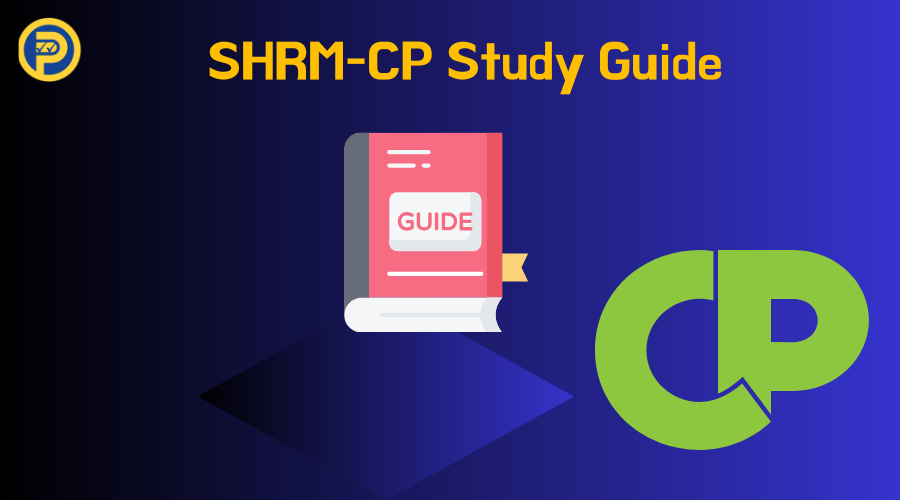The SHRM Certified Professional (SHRM-CP) exam is a crucial certification for HR professionals, validating their knowledge and competencies in human resource management.
To effectively prepare for this exam, candidates can benefit from a structured study guide that covers the various subject areas included in the exam.
This article will outline how to prepare for each of the key components of the SHRM-CP exam, providing insights and strategies to enhance study efforts.
Read more: What are SHRM-CP Scores?
Understanding the SHRM-CP Exam
Exam Structure and Content
The SHRM-CP exam comprises 134 multiple-choice questions, including 24 unscored items used for future test development. Candidates have 3 hours and 40 minutes to complete the exam. The questions are categorized into two main types:
- Knowledge-Based Questions: These assess understanding of factual information related to HR practices and concepts.
- Situational Judgment Questions: These present real-world scenarios requiring candidates to apply their HR knowledge and judgment to select the best course of action.
The exam assesses candidates across several knowledge domains, including Organization, People, Leadership, Business, Interpersonal, and Workplace, each representing a critical area of HR practice.
| Knowledge Domain | Percent of Exam | Approximate Number of Questions |
| Organization | 18% | 24 |
| People | 18% | 24 |
| Leadership | 17% | 23 |
| Business | 16.5% | 22 |
| Interpersonal | 16.5% | 22 |
| Workplace | 14% | 19 |
Check out: How to Register for SHRM
Eligibility Requirements
Candidates must meet certain educational and professional experience criteria to be eligible for the SHRM-CP exam. While there are no strict prerequisites, it is primarily aimed at HR professionals engaged in operational HR duties or those pursuing a career in HR management.
Learn more: How do I Get SHRM Certified?
Preparing for the SHRM-CP Exam
Utilizing the SHRM Learning System
The SHRM Learning System is the most comprehensive resource for SHRM certification exam preparation.
It includes interactive learning modules, practice questions, and customizable study plans, allowing candidates to tailor their study approach based on their strengths and weaknesses.
Study Aids and Additional Resources
In addition to the SHRM Learning System, candidates can utilize various study aids, including study guides, online courses, and practice tests. Resources like practice questions and exam strategies offer structured courses to reinforce knowledge.
Check out: SHRM Certification Courses Online
Developing Effective Study Habits
- Set a Study Schedule: Allocate specific times for studying each knowledge domain and stick to the schedule.
- Use Active Learning Techniques: Engage with the material through summarization and discussion.
- Take Breaks and Manage Stress: Incorporate breaks into study sessions and practice relaxation techniques.
- Join Study Groups: Collaborate with peers to enhance understanding and motivation.
Subject Areas of the SHRM-CP Exam
Organization
The Organization domain focuses on understanding the structure and design of organizations, including various types of organizational structures and their implications for HR practices.
Candidates should study organizational behavior, change management, and the role of HR in supporting organizational goals.
Effective preparation includes reviewing case studies that illustrate how organizational structure impacts HR functions and employee engagement. Utilizing resources like the SHRM Learning System can help reinforce these concepts through practical examples and exercises.
People
The People domain emphasizes the importance of talent acquisition, development, and retention. Candidates should familiarize themselves with recruitment strategies, workforce planning, performance management, and employee development programs.
To prepare, candidates can analyze best practices in talent management and review relevant legislation affecting employment practices.
Engaging with interactive learning modules and practice questions can enhance understanding and application of these concepts in real-world scenarios.
Leadership
In the Leadership domain, candidates will explore the role of leadership in fostering a positive workplace culture and driving organizational success. Topics include leadership styles, team dynamics, and conflict resolution.
Preparing for this area involves studying different leadership theories and their application in HR settings. Candidates should also consider participating in discussions or workshops that focus on leadership challenges and strategies to develop effective leadership skills.
Business
The Business domain covers the intersection of HR and business operations, emphasizing the need for HR professionals to understand financial principles, strategic planning, and organizational metrics.
Candidates should focus on how HR contributes to overall business strategy and performance. To prepare, reviewing case studies that illustrate HR’s impact on business outcomes can be beneficial.
Additionally, engaging with financial and strategic planning resources will enhance candidates’ understanding of business fundamentals.
Interpersonal
The Interpersonal domain addresses the importance of communication, collaboration, and relationship-building in the workplace. Candidates should study effective communication techniques, negotiation skills, and conflict management strategies.
Preparation can include role-playing exercises to practice these skills in simulated scenarios. Utilizing resources such as peer feedback and mentorship can also provide valuable insights into improving interpersonal effectiveness.
Workplace
The Workplace domain encompasses the legal and ethical aspects of HR management, including compliance with labor laws, diversity and inclusion initiatives, and workplace safety.
Candidates should familiarize themselves with relevant legislation and best practices for creating an inclusive and safe work environment.
To prepare, reviewing case studies and current events related to workplace issues can enhance understanding. Engaging with legal resources and attending workshops on compliance can further solidify knowledge in this area.

How does the SHRM BASK Blueprint Guide the SHRM-CP Exam Questions?
The SHRM Body of Applied Skills and Knowledge (BASK) serves as the foundational blueprint for the SHRM-CP exam. It outlines the competencies and knowledge areas that candidates must master to succeed in their HR roles and on the exams.
Understanding how the SHRM BASK guides exam questions is crucial for effective preparation.
Overview of SHRM BASK
The SHRM BASK is a comprehensive framework that delineates 14 HR functional areas and nine behavioral competencies essential for HR professionals.
This framework informs the development of exam questions, ensuring they align with the skills and knowledge required in the HR field. The BASK differentiates between the SHRM-CP and SHRM-SCP exams, specifying the content and proficiency indicators relevant to each certification level.
This differentiation is vital, as it allows candidates to tailor their study strategies based on their current competencies and the requirements of the exam they are pursuing.
Proficiency Indicators
Proficiency indicators within the BASK define the expected level of performance for each certification. They guide candidates in identifying which competencies they need to focus on for the SHRM-CP versus the SHRM-SCP exams.
For instance, while both exams cover similar content, the SHRM-SCP exam requires a deeper understanding and application of strategic HR concepts. Candidates are encouraged to use these indicators to create a focused study plan that addresses their strengths and weaknesses.
Study Resources Aligned with SHRM BASK
To effectively prepare for the SHRM-CP exam, candidates should utilize SHRM-developed study materials that align with the BASK.
The SHRM Learning System, for example, offers a customizable study plan and includes practice questions that reflect the actual exam format.
Additionally, Prepsaret’s SHRM-CP Test Prep contains study guides and workbooks provide insights into the exam structure and also includes practice questions that have been previously administered.
Research indicates that candidates who prepare using SHRM-endorsed materials experience significantly higher pass rates compared to those who do not.
In summary, the SHRM BASK is not just a theoretical framework; it is a practical tool that directly influences the structure and content of the SHRM-CP exam.
By understanding and utilizing the BASK, candidates can enhance their preparation and increase their chances of success on exam day.
Exam Day Preparation
Understanding Test Center Procedures
Familiarizing oneself with test center protocols can alleviate anxiety. Candidates should review the security measures and procedures for check-in, as well as the rules regarding personal items during the exam.
Knowing what to expect can help candidates feel more at ease on exam day.
Check out: SHRM-CP Free Questions
Final Review Strategies
In the days leading up to the exam, candidates should focus on:
- Reviewing Key Concepts: Go over critical HR theories, laws, and practices that are likely to appear on the exam.
- Taking Final Practice Tests: Engage in timed practice tests to assess readiness and adjust study focus based on performance.
- Rest and Nutrition: Ensure adequate sleep before the exam and maintain a balanced diet to support cognitive function.
FAQS
Is the SHRM-CP Exam Hard?
The SHRM-CP exam is considered moderately difficult, with a pass rate around 70%. Candidates should expect to spend 41-200 hours preparing to maximize their chances of passing.
While some may pass without studying extensively due to prior experience and education, most will need to put in significant preparation time. Effective study strategies include using practice tests, focusing on key concepts, and understanding common SHRM-favored answers.
With proper preparation, the SHRM-CP exam is passable for dedicated candidates.
Additionally, you can opt for our Pay Someone To Take my SHRM Certification for Me (Prepsaret link to go here) service and let our SHRM experts do the test for you.
How Long Should You Study for SHRM-CP?
For the SHRM-CP exam, candidates typically need to study between 41 to 200 hours for optimal performance.
Research indicates that peak preparation occurs when candidates dedicate 81 to 120 hours, with diminishing returns noted for those studying beyond 200 hours.
A structured study plan over 12 weeks, averaging 3-7 hours weekly, is recommended to enhance retention and understanding of the material.
This approach allows candidates to assess their strengths and weaknesses, ensuring focused preparation on key areas necessary for passing the exam.
What is the Pass Rate for SHRM-CP?
The pass rate for the SHRM-CP exam is around 67%. This percentage can fluctuate based on factors such as preparation methods, seeking SHRM exam help services(Prepsaret link to go here), and individual study habits.
Candidates who prepare using both the SHRM Body of Applied Skills and Knowledge (SHRM BASK) and the SHRM Learning System are 36% more likely to pass the SHRM-CP exam.
However, candidates should avoid over preparing, as SHRM-CP exam performance starts to decline when preparation exceeds 120 hours.

